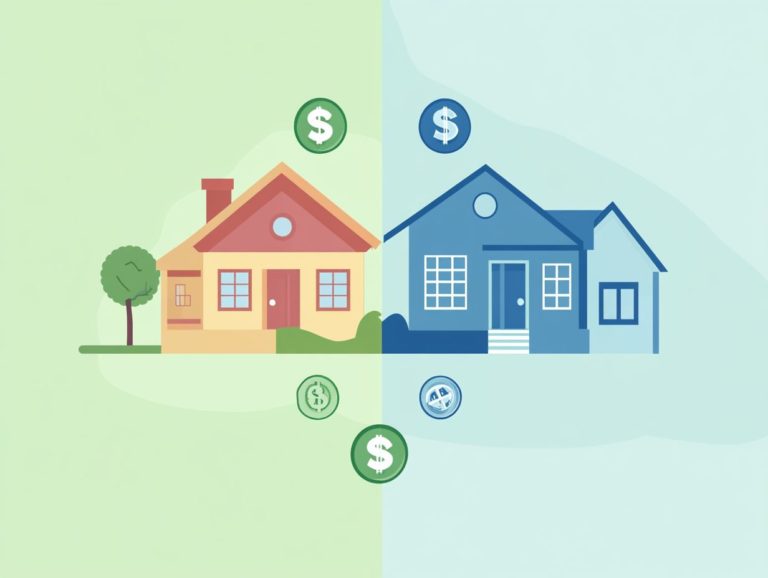Types of Mortgages: A Comprehensive Overview
Navigating the world of mortgages can feel overwhelming. However, grasping the fundamentals is essential for making informed decisions.
This article breaks down various mortgage types, from fixed-rate options for stability to adjustable-rate mortgages for flexibility. We also explain government-backed loans and specialty mortgages like jumbo and reverse loans.
By the end, you’ll have the insights to choose the perfect mortgage for your unique situation.
Contents
Key Takeaways:
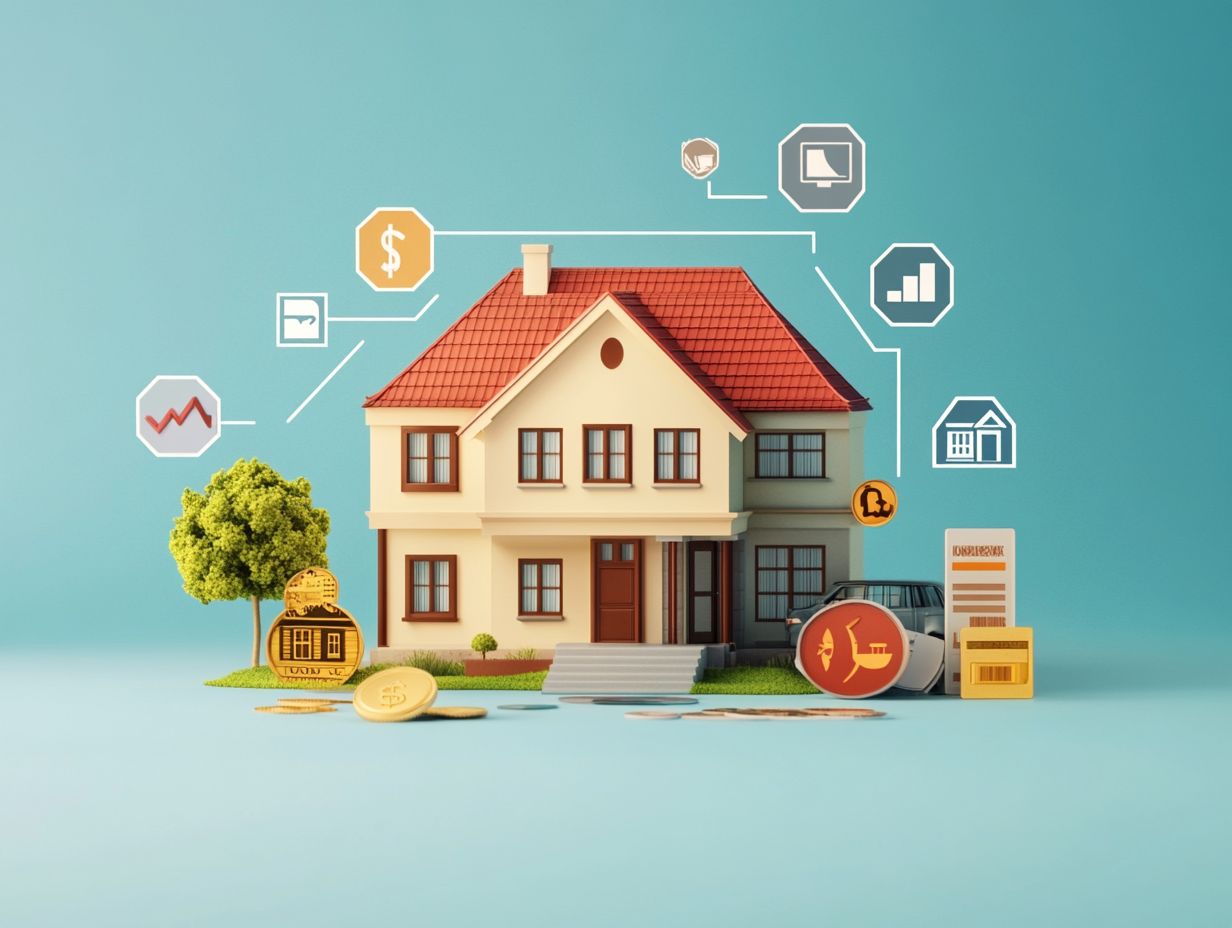
A mortgage is a loan to finance a home. The two main types are fixed-rate and adjustable-rate mortgages. Fixed-rate mortgages offer stable payments, while adjustable-rate mortgages may provide lower initial rates and suit short-term ownership or falling interest rate environments. Government-backed and specialty mortgages offer options for those who may not qualify for traditional loans or need special features.
Understanding Mortgages
Understanding mortgages is crucial for prospective homebuyers due to the substantial financial commitment involved.
A mortgage is a home loan that allows you to buy real estate. You finance the property while repaying the lender, usually with added interest.
Whether you choose a fixed-rate mortgage with predictable payments or an adjustable-rate mortgage that may start lower but can change, it’s vital to understand these options.
Familiarizing yourself with government-backed loans, like FHA, VA, or USDA loans, prepares you to navigate the complex housing market.
Definition and Basic Concepts
A mortgage is a legal agreement where a lender provides financing to purchase a home, using the property as security. If you miss payments, the lender can take your property through foreclosure.
Commonly known as a home loan, a mortgage usually requires a down payment. This is a percentage of the home’s price paid upfront. Your credit score is important here, as it shows your creditworthiness and affects the interest rate and terms the lender offers.
Generally, higher credit scores lead to better mortgage conditions, allowing you to borrow more and pay less monthly.
Fixed-Rate Mortgages
A fixed-rate mortgage is a loan with a steady interest rate for its entire term.
This stability means predictable monthly payments, helping you plan your finances effectively.
Features and Benefits
Fixed-rate mortgages offer stable payments and predictable interest rates, making them appealing for homeowners. This stability protects you from unexpected economic changes, offering peace of mind.
In an ever-changing interest rate landscape, a fixed-rate mortgage locks in your rate, shielding you from market shifts. While mortgage insurance may be required with smaller down payments, many homeowners find the reliability of this option hard to resist.
This loan is a fantastic way to secure your financial future, whether during downturns or growth periods, ensuring long-term savings and predictability.
Adjustable-Rate Mortgages
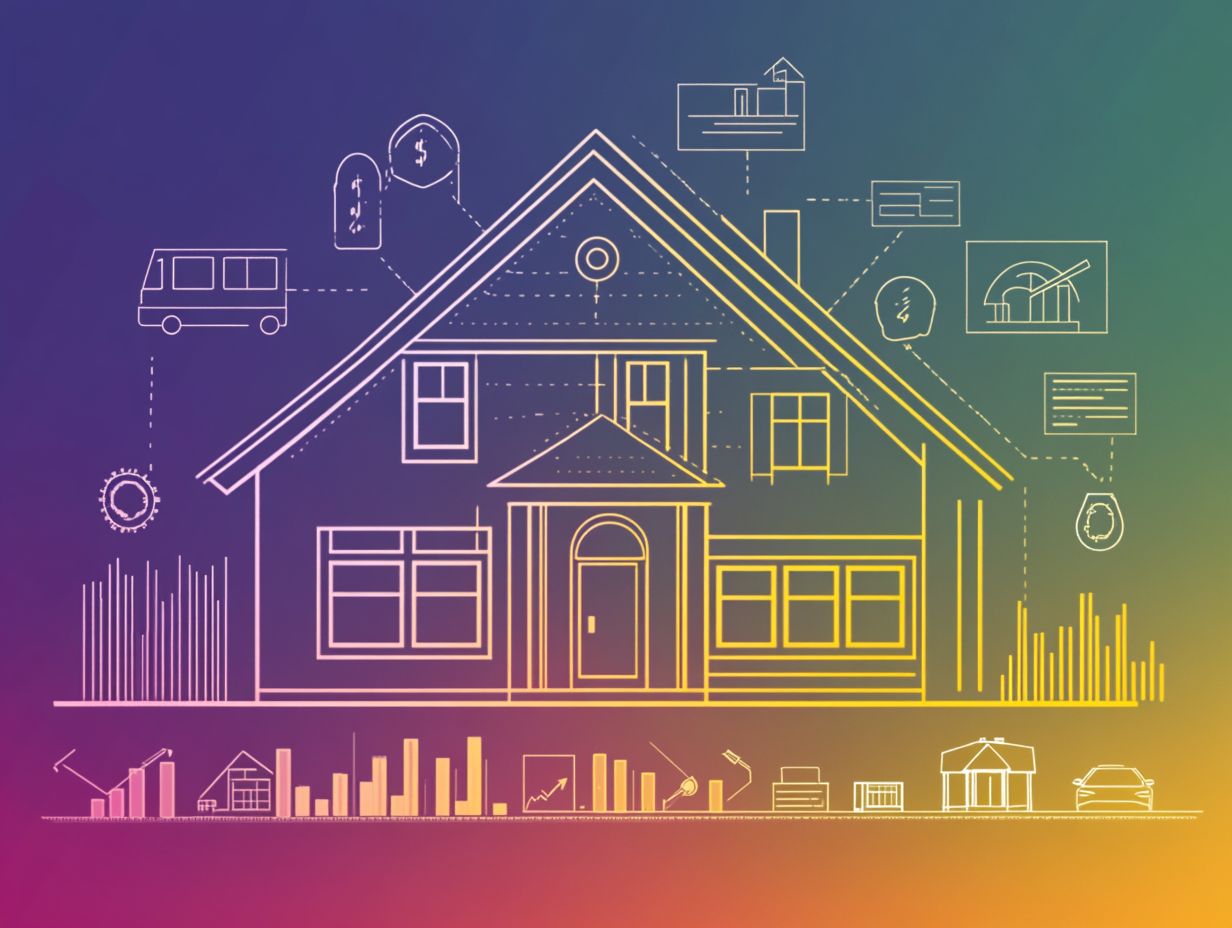
Adjustable-rate mortgages (ARMs) offer flexibility. You start with a fixed interest rate for a set time, and then the rate adjusts based on market conditions.
This means your monthly payments can change, providing both opportunities and risks as financial landscapes shift.
How They Work and Who They Are Best For
Adjustable Rate Mortgages (ARMs) often entice borrowers with their initial lower interest rates compared to fixed-rate mortgages. This makes them particularly attractive if you plan to move or refinance before those adjustments kick in.
This initial lower rate can translate into significant savings, especially during the early years of the loan. However, once that fixed-rate period ends, the interest rate will adjust according to a specified index, which can lead to fluctuations in your monthly payments.
It s crucial to evaluate your financial situation and future plans when considering an ARM. If you expect a short-term stay in your home or foresee interest rates remaining stable, an ARM might be the best fit for you.
These loans can be advantageous if you want to maximize cash flow or purchase in a higher price bracket while enjoying those enticing initial lower rates.
Government-Backed Mortgages
Government-backed mortgages, such as FHA loans, VA loans, and USDA loans, present exceptional opportunities.
These options allow for lower down payments and flexible qualification standards, making homeownership more accessible than ever.
Types and Eligibility Requirements
- FHA Loans: Appeals to first-time homebuyers with lower down payment options and forgiving credit score standards.
- VA Loans: Designed for veterans and active-duty military personnel, offering no down payment and no mortgage insurance.
- USDA Loans: Encourage rural development and offer favorable terms for low to moderate-income families in designated areas.
It s also vital to understand mortgage insurance, which is the fee that protects the lender if you can t pay your loan. FHA loans typically require mortgage insurance premiums (MIP), while VA loans are free from insurance fees, leading to lower overall costs for eligible veterans.
This financial detail can profoundly influence your budget and long-term affordability.
Specialty Mortgages
Specialty mortgages are designed to meet your unique financial circumstances, presenting options such as jumbo loans, reverse mortgages, and physician loans.
These tailored solutions offer unique advantages that could change your financial future!
Jumbo, Reverse, and Other Options
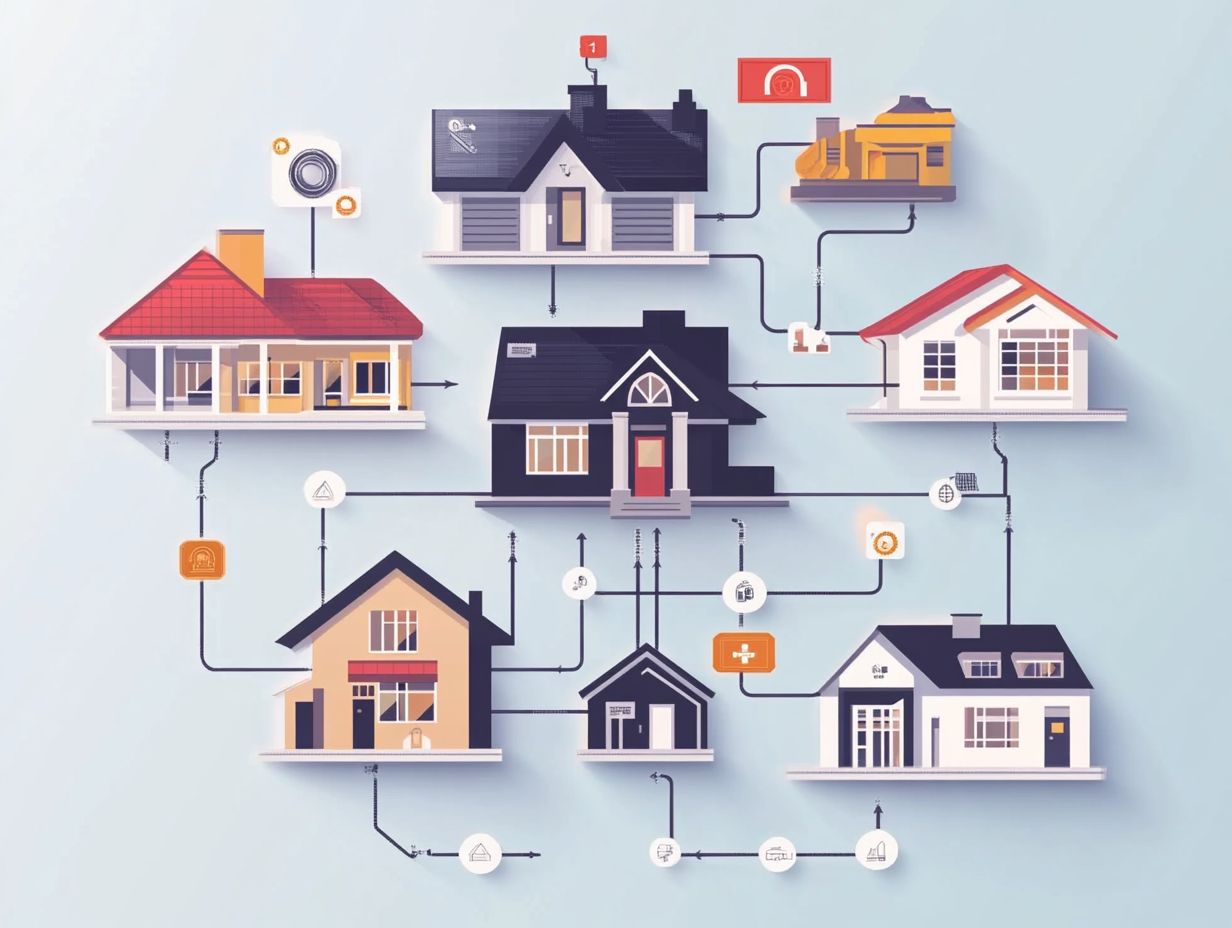
Jumbo loans exceed conventional loan limits, while reverse mortgages allow you to convert your home equity into cash, offering financial flexibility during retirement. Both financial tools serve distinct purposes but can profoundly influence your financial landscape.
Jumbo loans are crucial for acquiring high-value properties, providing larger loan amounts without the constraints of conforming loan limits perfect for affluent buyers.
Conversely, reverse mortgages enable senior homeowners to tap into their home equity without the burden of monthly repayments, helping you maintain liquidity while enjoying your home.
Additionally, construction loans support the building of new homes or extensive renovations, while home equity lines of credit grant you access to your property s value for various needs, enhancing your overall financial resilience.
Choosing the Right Mortgage for You
Selecting the right mortgage is an essential financial decision that requires careful attention to several key factors.
Consider your budget, financial aspirations, and the diverse loan options presented by various mortgage lenders.
Each element plays a crucial role in ensuring you make an informed choice that aligns with your long-term objectives.
Start exploring your options today to find the mortgage that fits you best!
Factors to Consider and Key Questions to Ask
When choosing a mortgage, consider interest rates and monthly payments. Also, check if mortgage insurance is required based on your down payment.
It’s important to check the loan term. Longer terms may have lower monthly payments but can lead to higher total interest costs.
Evaluating the flexibility of the mortgage is crucial, especially regarding refinancing options if interest rates drop in the future.
Don t hesitate to ask your lender specific questions. Inquire about fees associated with the loan, how rates have varied historically, and whether there are any prepayment penalties.
Asking these questions can significantly affect your mortgage s financial impact. Don t overlook them!
Frequently Asked Questions
What is a mortgage?
A mortgage is a loan taken out to purchase a property. It is secured by the property itself. The borrower makes monthly payments to repay the loan along with interest until the entire amount is paid off.
What are the different types of mortgages?
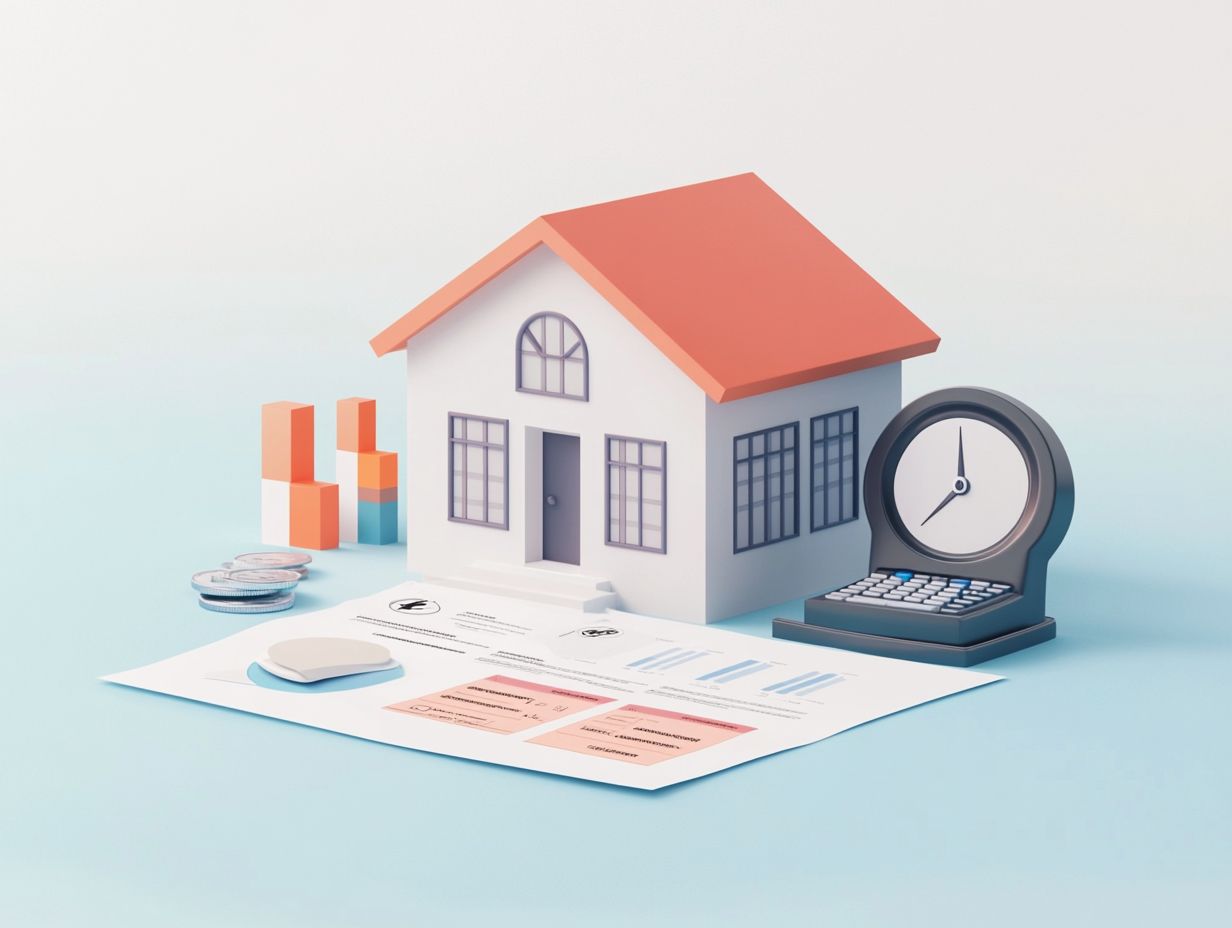
There are several types of mortgages, including fixed-rate, adjustable-rate, government-insured, and conventional mortgages. For new buyers, understanding mortgage types is crucial, as each type has its own features, benefits, and eligibility requirements.
What is a fixed-rate mortgage?
A fixed-rate mortgage is a type of mortgage where the interest rate remains the same throughout the entire loan term. This allows for predictable monthly payments and protects against rising interest rates.
How does an adjustable-rate mortgage work?
An adjustable-rate mortgage (ARM) is a type of mortgage where the interest rate can fluctuate over time. The initial rate is usually lower than a fixed-rate mortgage, but it can increase or decrease depending on market conditions.
What is the difference between a government-insured and conventional mortgage?
A government-insured mortgage, such as an FHA or VA loan, is backed by the government and offers more flexible eligibility requirements. A conventional mortgage is not insured by the government and typically has stricter eligibility criteria.
What are the main factors to consider when choosing a mortgage?
When choosing a mortgage, it’s important to consider the interest rate, loan term, monthly payments, down payment requirements, and closing costs. These factors can vary depending on the type of mortgage and your personal financial situation.




